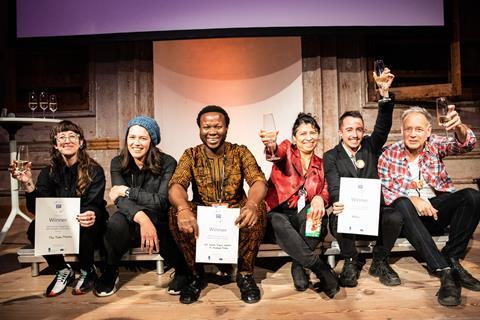
Mexico’s Niñxs and US project The Tuba Thieves from the US have won awards at IDFA Forum, IDFA’s international co-production and co-financing market for documentaries.
Niñxs from Kani Lapuerta won the IDFA Forum Award for best pitch on Tuesday night. The documentary, co-produced by Mexico’s La Sandía Digital Producción Audiovisual and Germany’s Jyoti Film and Dirk Manthey Film, is about a transgender girl on her journey to adolescence.
Jury members Gugi Gumilang, Marieke van den Bersselaar, and Natalia Libet applauded “the sincere and close connection between the protagonist and filmmaker and the witty tone of the trailer”.
Meanwhile, US project The Tuba Thieves directed by Alison O’Daniel won the award for best rough cut. The film takes as its starting point the fact that between 2011 and 2013 there was a spate of tuba thefts from Los Angeles high schools.
“The Tuba Thieves is not about thieves or missing tubas. Instead, it asks what it means to listen,” reads the filmmakers’ description of a film. The jury said it “makes viewers aware of sound in an engaging and unique way”.
The IDFA DocLab Forum jury of Faye Kabali-Kagwa, Marie Blondiaux, and Zeina Abi Assy chose Osakpolor Omoregie’s We Speak Their Names In Hushed Tones for their award. The Nigerian-South African co-production about migration is produced by Antoinette Engel for Electric South.
We Speak Their Names In Hushed Tones is currently in pre-production and is expected to be ready by summer 2023. “We thought that this project, still in an early stage, was a very promising way to use virtuality, namely 3D, to talk about people that can themselves become virtual,” said the jury.
The three projects are all awarded a cash prize of €1,500. The Tuba Thieves will also receive closed captioning and subtitles from inVision Subtitling.
This year, both IDFA’s Forum and Docs for Sale took place in Felix Meritis, an imposing 18th Century building on several floors, which venue earned a broadly positive reception from industry delegates and prompted one producer to describe it as “the Kafka house” on account of its rooms within rooms and elaborate lay-out.
One Forum project which received strong feedback from distributors was Maryam Ebrahimi’s The Phantom Pain Of Rojava, set in a house for wounded guerrilla soldiers in northern Syria and produced through Mantaray Film, the Swedish outfit behind The Most Beautiful Boy In The World.
Attendees upbeat about event, discuss market challenges
“The market today is difficult, more difficult than before the pandemic because of the lack of money and the lack of equity,” Mantaray’s Stina Gardell said of the predicament facing documentary producers, distributors and sales agents. “We need to rely on public service channels, institutions, Creative Europe and other funds.”
However Gardell also spoke of her “happiness” about this year’s Forum. “IDFA has been one of the most important forums for us but it was a bit difficult some years for the creative documentaries that we are making to find a good position here because there is so much TV and current affairs,” she added. “But this year I have the feeling it has opened up.”
Producer-director Viktor Nordenskiöld of Swedish outfit Freetown Films AB, who was pitching his new Syrian refugee project Lust For Life in the Forum, was also upbeat about the event. “I liked it a lot. This producer connection pitching, I like it a lot as well.”
One vexed issue raised during the industry panel ‘(Co-)Production in a changing financing landscape’ was the role of executive producers in feature documentaries and when financiers should get executive producer credits.
“In documentary, most executive producers are not creatively involved,” said Ina Fichman of Intuitive Pictures) of what continues to be a contentious subject. “That’s part of the deal. You don’t want 20 people watching cuts who may not know anything about films.”
Fichman gave an example of an investor asking for an executive producer credit after investing $10,000 in one of her projects which had a budget of $1.4m. “That was really not something we should have done,” she stated. “A lot of investors who were not putting that much money in were requiring executive producer credits. Then you go to Sundance and you see [an investor], this is their 50th film in Sundance, or 25th film – and you realise they’ve put in $10,000 and got an EP credit. It sort of discredits credits.”
Deals have closed in recent days. For instance, Slave Island, a Belgian-produced documentary about modern day slavery in Indonesia made through Antwerp-based Harald House, has been pre-bought by Periscoop for The Netherlands and will be released by Dalton Distribution in Belgium. World sales are handled by Canadian outfit FilmOption.
IDFA Forum runs until Wednesday (November 16) and IDFA itself continues until the weekend (November 20).
























No comments yet